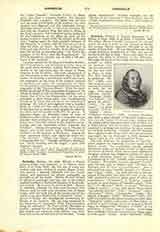

Corneille, PIERRE, a French dramatist, b. at Rouen, June 6, 1606; d. at Paris, October 1, 1684. His father, Pierre Corneille, was avocat du roi and Maitre des eaux et forets in the Vicomte of Rouen. His mother, Marthe Lepesant, belonged to an old family of Normandy. He was educated at the Jesuit college in Rouen, studied law at Caen, and was admitted to the Bar in 1624. Four years later he was granted the office of Advocate to the Admiralty. Although the duties of his charge allowed him leisure enough to follow his poetical vocation, he soon quitted the Bar and went to Paris, in 1629. The first comedy he produced, “Melite” (1629), met with so great a success that he resolved to write for the stage. Other plays followed rapidly: “Clitandre” (1632), “La Veuve”, “La galerie du palais’ (1633), “La suivante”, “La place royale” (1634), “Medee” (1635), “L’illusion comique” (1636). Cardinal Richelieu, who took a great interest in dramatic matters and was even the writer of several plays, realized that the young author had some talent and enrolled him, in 1633, among “the five authors”, whose functions consisted in revising and polishing the plays written by the great politician. Corneille was too independent a genius to get along easily with the autocratic playwright; he was dismissed, in 1635, because he had no esprit de suite, and returned to Rouen.
The year 1636 saw the production of “Le Cid”, which marked the beginning of a new epoch in the French drama. Its remarkable success aroused Richelieu’s anger and jealousy to such a degree that the French Academy, which was so much indebted to the great cardinal, was obliged to criticize the play in a public pamphlet, known as “Les sentiments de l’Academie sur he Cid”, written, under command, by Chapelain. The public, however, admired “Le Cid” none the less, and, as Boileau said, “all Paris saw Rodrigue with the same eyes as Chimene”. After a silence of four years Corneille brought out “Horace” and “Cinna” (1640). The poet was then in full possession of his talent and from this time to the year 1651 produced a series of plays, most of which are masterpieces: “Polyeucte”, a Christian tragedy, perhaps the most perfect of Corneille’s plays; “Pom-pee”; “Le Menteur” (1643), a comedy; “Theodore, vierge et martyre”, a very poor drama which failed; “La suite du menteur” (1645); “Rodogune” (1646); “Heraclius” (1647); “Andromede” (1650); “Don Sanche d’Aragon” (1650); “Nicomede” (1651). Corneille was elected to the French Academy in 1647. After “Pertharite” (1653), which was a decided failure, he resolved to quit the stage, and in his retreat at Rouen began to translate the “Imitation of Christ” at the solicitation of Queen Anne of Austria. A few years later, yielding to Fouquet’s entreaties, he began again to write plays: “Aedipe” (1659), “Sertorius” (1662), “Sophonisbe” (1663), “Othon” (1664), “Agesilas” (1666), “Attila” (1667), “Tite et Berenice” (1670), “Pulcherie” (1672), “Surena” (1674), which, in spite of a few sparks of genius, show too well the decline of a once powerful playwright. Besides his plays Corneille wrote in prose “Discours sur l’art dramatique et examens” (1660), and contributed several poems to the “Guirlande de Julie”.
Corneille was a true Christian. For years he served as churchwarden of the church of Saint-Sauveur in Rouen, and discharged his duties most religiously. Towards the end of his life he sold the house in which he was born to give a dowry to his daughter, who entered the Order of Saint Dominic. In all his dramas he constantly pursued a lofty ideal, showing men “as they should be”, and representing characters whose heroism, sense of duty, and readiness to self-sacrifice contain lessons of highest morality. The standard text of Corneille’s works is the edition of Marty-Laveaux (2 vols., Paris, 1862-68).
LOUIS N. DELAMARRE

